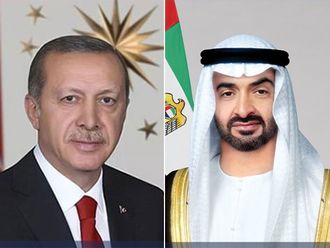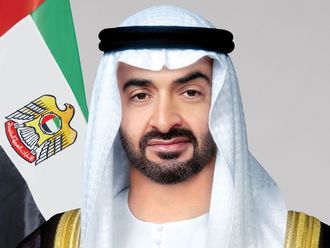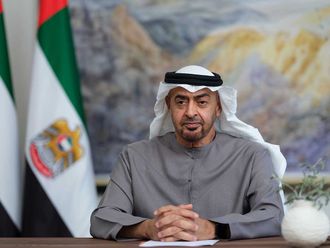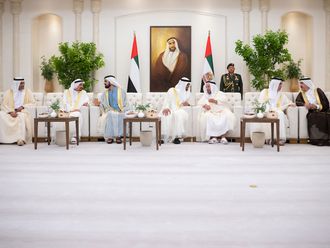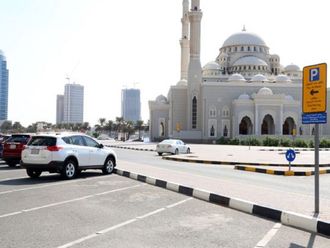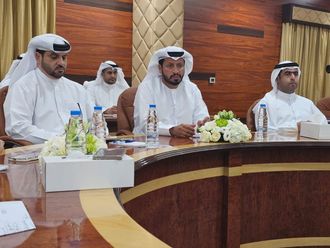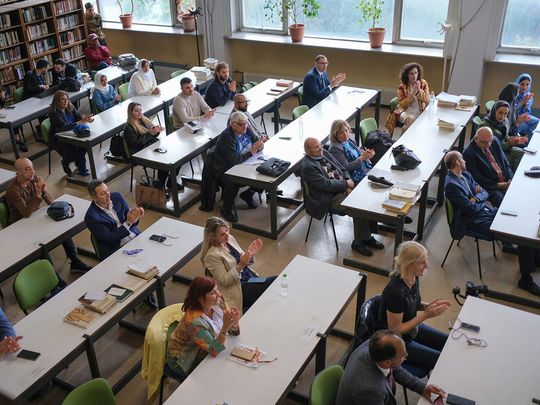
Thessaloniki: In a demonstration of lasting cultural connections, scholars and writers from the UAE and Greece highlighted the interaction between Arab and Greek cultures at the inaugural session at the Thessaloniki International Book Fair, where Sharjah is being celebrated as the Guest of Honour.
Scholars touched upon various realms such as literature, poetry, art, philosophy, and thought at the joint session. This dialogue covered the historical roots of this exchange, spanning from the times of Aristotle to Al Farabi, and lauded its present-day expressions propelled by Sharjah’s worldwide initiatives. The participants drew comparisons between Sharjah’s current cultural influence and the legacy of the House of Wisdom in Baghdad during the reign of Caliph Al Ma’mun.
Inaugural session
The session, titled ‘Manifestations of Poetic Expression in Both Modern Arabic and Modern Greek Poetry’, took place at the University of Thessaloniki and featured Dr Ioanna Naoum, Assistant Professor of Comparative Literature, Department of Greek Philology, Aristotle University of Thessaloniki (AUTH); Emirati poet Ibrahim Al-Hashemi; Chloe Koutsoubeli, Greek poet and Vice President of the Creative Writers Association of Thessaloniki; and Persa Koumoutsi, anthologist and translator of Arabic poetry into modern Greek.
The panel discussion, moderated by Dr Angeliki Ziaka, Professor of the Study of Religion at AUTH, was held in the presence of Ahmed Bin Rakkad Al Ameri, CEO of the Sharjah Book Authority; Professor Konstantinos Bikos, Dean of the Department of Greek Philosophy at Aristotle University of Thessaloniki; and Nikos Koukis, President of the Hellenic Cultural Foundation, in addition to Greek and Emirati writers, intellectuals, and media representatives.
also read
- Watch: Emirati culture takes centre stage in Greece as Thessaloniki Book Fair opens
- Thessaloniki International Book Fair: Why Sharjah’s Guest of Honour role at the event in Greece has global significance
- Revealed: Sharjah's Guest of Honour agenda at Thessaloniki International Book Fair 2024 in Greece
Deep historical ties
Dr Angeliki Ziaka opened the session by noting the historical ties between Greek and Arab cultures, evidenced by numerous contributions in the realms of thought, philosophy, art, and poetry from both civilisations over the millennia.
During the discussion, Emirati poet Ibrahim Al Hashimi provided an overview of the evolution of Arabic poetry from the pre-Islamic era to the present. He highlighted the distinctive features of modern and contemporary Arabic poetry, noting its departure from classical forms and its exploration of new themes. Al Hashimi explained that modern Arabic poetry favours simplicity in vocabulary, structure, and style.
“The most prominent features of modern Arabic poetry include the disappearance of many old themes such as pride and satire, increased use of imagination, departure from strict rhyme schemes, use of symbolism, and the emergence of new trends such as political, national, and humanistic poetry,” he said.
Al Hashimi also highlighted that foreign cultures and the translation of their literature have had a direct impact on modern Arabic poetry, noting that many Arab poets have been influenced by the works of Western poets.
Relationship between Arab and Greek cultures
Discussing the connections between the two cultures, Dr Ioanna Naoum said: “The relationship between Arab and Greek cultures, exemplified today by Sharjah’s presence, is both long-standing and continually renewed.” She highlighted that the ‘Age of Enlightenment’ around the 17th and the 18th centuries underscored the significant contributions of Arab culture to Western and human civilisation.
Importance of literature
Naoum added that the strength and energy of literature form the foundation of relationships between civilisations and cultures, as literature uniquely migrates, travels, and opens channels of communication among people. She asserted that globalisation has altered perceptions of local literature, which focuses on specific cultures, arguing that such literature cannot be abandoned or disappear.
Contemporary female poets
In the session, Greek poet Chloe Koutsoumpeli recited a selection of her most notable poems in Greek and their English translations, offering insight into the nuances of contemporary Greek poetry. She focused on themes that address the human soul and its ability to transcend personal anxieties, creating a global discourse shared by humanity.
Koutsoumpeli also discussed the works of various contemporary female poets in Greece. She referenced a collection by poet Georgia Diago titled ‘I Know Those Who Weave in the Middle of the Sea’, which explores the experiences of migrants crossing the sea to Greece.
Poem recitation
For her part, Greek translator Persa Koumoutsi recited a poem by fellow panellist Al Hashimi and noted that in the past three years, 15 poetry collections by Arab poets have been translated into Greek, highlighting the keen interest of Greek readers in translated Arabic poetry.
Arab culture in Greece
Sharjah is the first Arab Guest of Honour at the Thessaloniki International Book Fair, a recognition of its significant contributions to promoting Arab and global culture. The emirate’s participation in the event features a series of cultural and creative events, along with artistic and folk performances, showcasing the local and Arab culture to visitors of the book fair.


